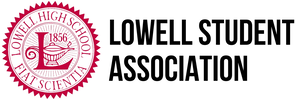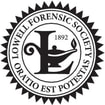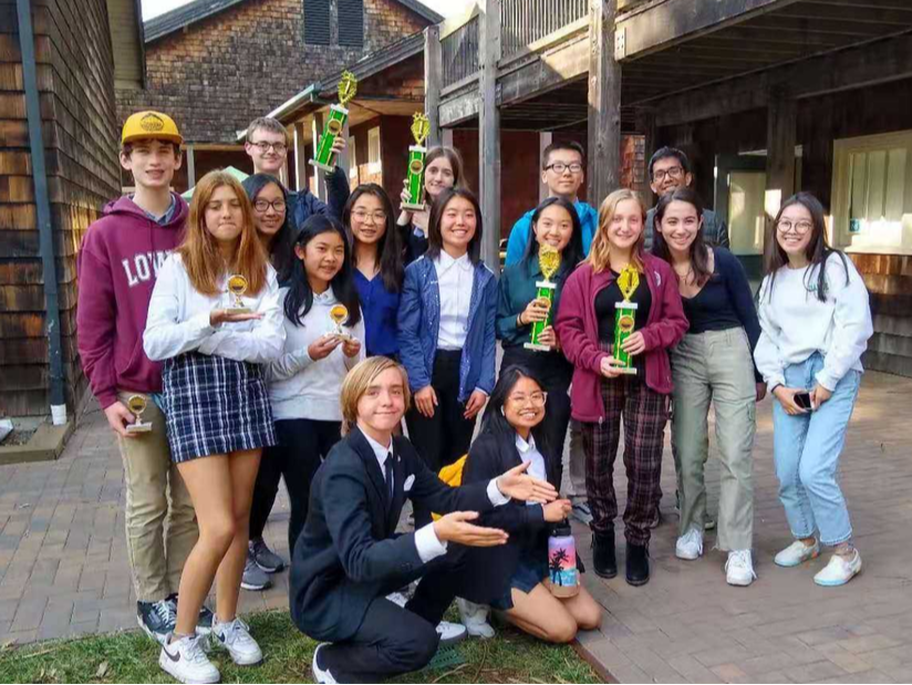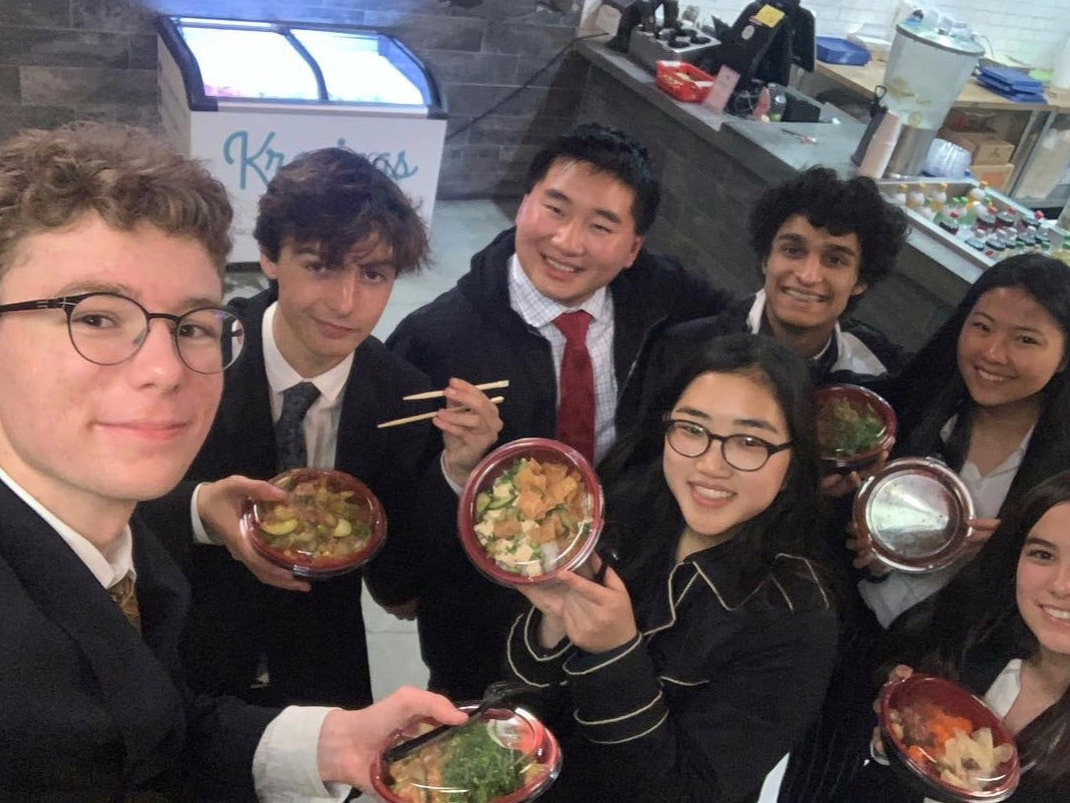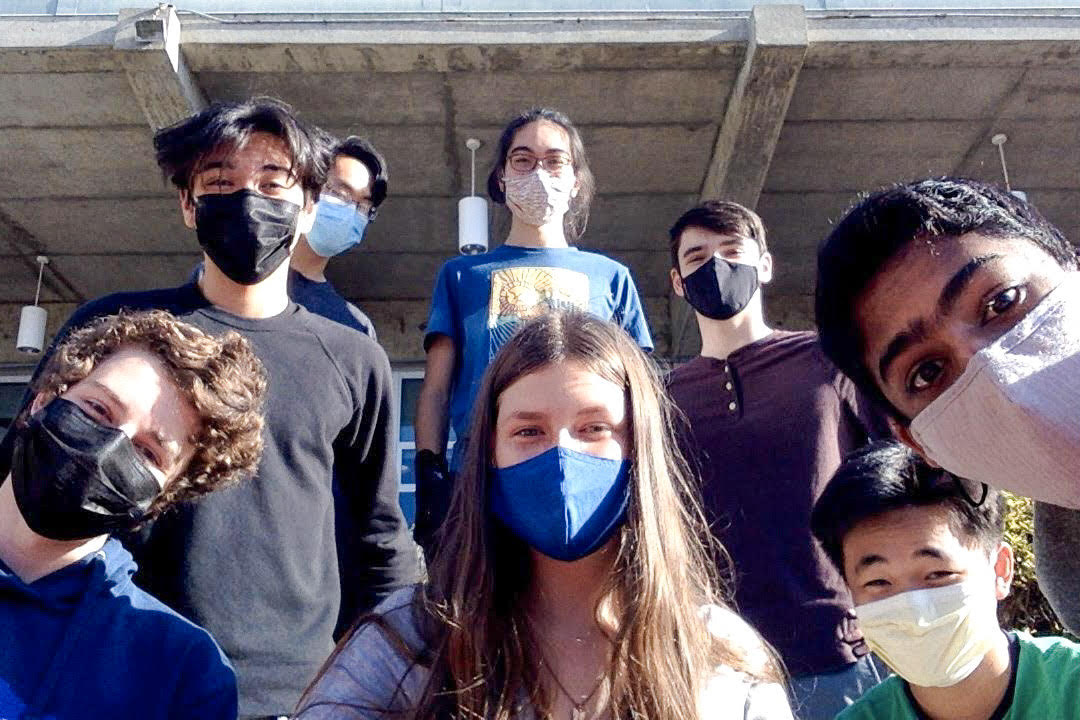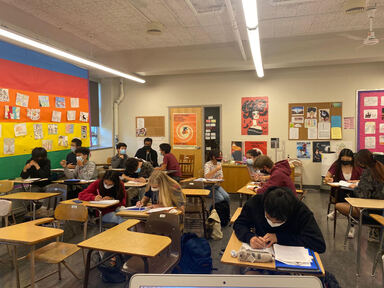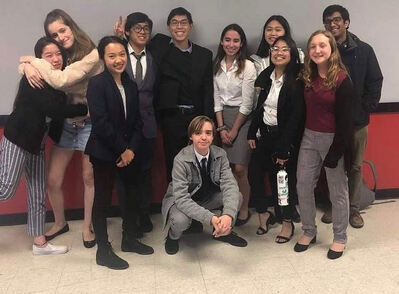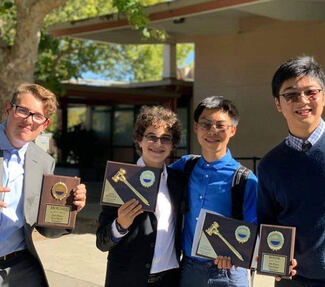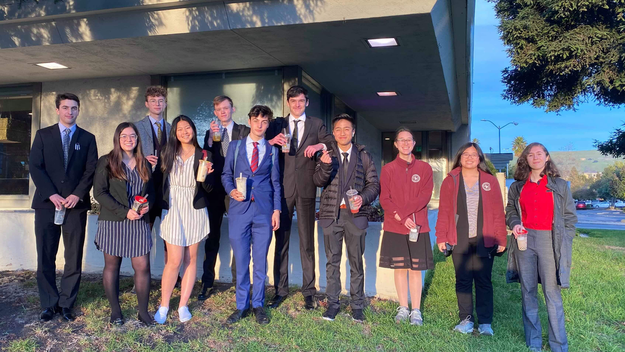The Lowell Forensic Society, founded in 1892, is the oldest high school speech and debate team in the United States and also the largest organization at Lowell High School in San Francisco, California. The society's home base is in Room 135, also known as "Leland Room," named after former Deputy Under Secretary of the Treasury Marc E. Leland.
With over 200 members, the team travels regularly to prestigious national invitations, including those hosted by the University of the Pacific (UOP), UC Berkeley, Stanford University, CSU Long Beach (CSULB), and Arizona State University (ASU). Lowell Forensics has also competed in the National Speech and Debate Tournament under the National Speech and Debate Association (formerly the National Forensic League, or NFL) for 40 years, making it one of the longest running national championship teams in the nation; as well as the Tournament of Champions, hosted by the University of Kentucky and the Tournament of Champions for the California Cup, hosted by Point of Information (the Parliamentary Debate Central Website).
Coached by Mr. Terence Abad and the skilled and dedicated directors, the Forensic Society has been able to transform Lowell students into skilled, intelligent public speakers. Just over the past season alone, the Lowell team has "broken" (qualified) squad members into the elimination rounds of every tournament that was attended by Lowell Forensics. If you would like to join the US's oldest high school speech and debate team (and the biggest student organization here at Lowell); or just want to check us out, feel free to find us in Room 135, or, check out the descriptions below for specific event details!
With over 200 members, the team travels regularly to prestigious national invitations, including those hosted by the University of the Pacific (UOP), UC Berkeley, Stanford University, CSU Long Beach (CSULB), and Arizona State University (ASU). Lowell Forensics has also competed in the National Speech and Debate Tournament under the National Speech and Debate Association (formerly the National Forensic League, or NFL) for 40 years, making it one of the longest running national championship teams in the nation; as well as the Tournament of Champions, hosted by the University of Kentucky and the Tournament of Champions for the California Cup, hosted by Point of Information (the Parliamentary Debate Central Website).
Coached by Mr. Terence Abad and the skilled and dedicated directors, the Forensic Society has been able to transform Lowell students into skilled, intelligent public speakers. Just over the past season alone, the Lowell team has "broken" (qualified) squad members into the elimination rounds of every tournament that was attended by Lowell Forensics. If you would like to join the US's oldest high school speech and debate team (and the biggest student organization here at Lowell); or just want to check us out, feel free to find us in Room 135, or, check out the descriptions below for specific event details!
Lowell Forensic Society Officers
Cabinet:
President: Win Neubarth
Vice President: Madison Li
Treasurer: Dora Chen
Secretary: Scarlett Carew
Directors:
Congressional Debate: Elisa Ma - [email protected]
Individual Events: Rema Raghu - [email protected]
Parliamentary Debate: Logan Ragland - [email protected]
Policy Debate: Jenny Liu - [email protected]
President: Win Neubarth
Vice President: Madison Li
Treasurer: Dora Chen
Secretary: Scarlett Carew
Directors:
Congressional Debate: Elisa Ma - [email protected]
Individual Events: Rema Raghu - [email protected]
Parliamentary Debate: Logan Ragland - [email protected]
Policy Debate: Jenny Liu - [email protected]
Branch Practice Information
Parliamentary
Meeting Dates and Times:
Monday 4PM - 5PM
Tuesday 4PM - 5PM
Thursday 4PM - 5PM
Designated Room:
Room 135
Congress
Meeting Dates and Times:
Monday 4PM - 5PM
Friday 4PM - 5PM
Designated Room:
Room 137
Policy
Meeting Dates and Times:
Monday 4PM - 5PM
Tuesday 4PM - 5PM
Thursday 4PM - 5PM
Designated Room:
Room 136
Individual Events
Meeting Dates and Times:
Monday 4PM - 5PM
Tuesdays 4PM - 5PM
Designated Room:
Room 134
Meeting Dates and Times:
Monday 4PM - 5PM
Tuesday 4PM - 5PM
Thursday 4PM - 5PM
Designated Room:
Room 135
Congress
Meeting Dates and Times:
Monday 4PM - 5PM
Friday 4PM - 5PM
Designated Room:
Room 137
Policy
Meeting Dates and Times:
Monday 4PM - 5PM
Tuesday 4PM - 5PM
Thursday 4PM - 5PM
Designated Room:
Room 136
Individual Events
Meeting Dates and Times:
Monday 4PM - 5PM
Tuesdays 4PM - 5PM
Designated Room:
Room 134
Parliamentary Debate
Parliamentary debate, or “parli”, is partner impromptu debate. In fast-paced rounds, a variety of topics, from domestic policy to pop culture to moral dilemmas, are debated with only 20 minutes of preparation beforehand. As a result, debaters develop the ability to think on their feet and formulate quick responses and arguments to their opponents’ points. Parliamentary debate hones public speaking skills in a real, non-scripted way that prepares debaters for future events and applies to real world scenarios. As parliamentary debate is partner-based, debaters also develop communication skills, teamwork, and friendship with others. Because of the plethora of knowledge needed for successful debating in this field, debaters will develop vast amounts of knowledge regarding current events. If you want to become that person that knows a little bit about everything, this is the place for you.
There is no experience required to join. Parli is easy to jump into and offers a limitless depth of skills and ideas to master. Interested? Contact Micah Mangot - [email protected]
There is no experience required to join. Parli is easy to jump into and offers a limitless depth of skills and ideas to master. Interested? Contact Micah Mangot - [email protected]
Congressional Debate
Congressional Debate, also known as “Congress,” seeks to emulate the real life United States Congress. Here, unlike other branches of Forensics, you are put in a room with 10-15 others. Watch out! They could be friend or foe.
Competitors choose their own side on a variety of mock legislation and bills submitted by students (this could even be you)! These topics are given one month in advance and will be unique every tournament. You’ll always have something different to learn and do research on.
At Congress, you’ll learn all there is to know about improving public speaking skills, research and analysis, and forming strong arguments. This is the branch which combines speech AND debate. Also, while you’ll be competing by yourself; members of Congressional Debate at Lowell are constantly surrounded by supportive and welcoming teammates!
Interested? Feel free to contact Contact Congress Director Jacob Gittelman at [email protected]
Competitors choose their own side on a variety of mock legislation and bills submitted by students (this could even be you)! These topics are given one month in advance and will be unique every tournament. You’ll always have something different to learn and do research on.
At Congress, you’ll learn all there is to know about improving public speaking skills, research and analysis, and forming strong arguments. This is the branch which combines speech AND debate. Also, while you’ll be competing by yourself; members of Congressional Debate at Lowell are constantly surrounded by supportive and welcoming teammates!
Interested? Feel free to contact Contact Congress Director Jacob Gittelman at [email protected]
Policy Debate
Policy debate is a form of debate competition in which teams of two advocate for and against a resolution that typically calls for policy change by the United States federal government. It is also referred to as "cross-examination debate" because of the 3-minute questioning period following each constructive speech. Affirmative teams generally present a plan as a proposal for implementation of the resolution.
Policy debate is done across the nation with large tournaments such as the Berkeley Invitational, Glenbrooks, the Stanford Invitational, and the Harvard invitational. Policy debate is done in college as well and whereas high schoolers have the Tournament of Champions (TOC), colleges have the National Debate Tournament (NDT). Since policy debate is regarded so highly by the college community, the best high school debaters are accepted into prestigious colleges like Harvard, Dartmouth, The University of Michigan, UC Berkeley, Georgetown, Northwestern, Emory, and more!
Lowell Policy Debate is a small team, but we’re composed of some of the hardest workers at Lowell. Some of our accomplishments include the Sweepstakes Award for best small team, garnering a multitude of wins from GGSAs, sending teams to the state tournament, Nationals, and the Tournament of Champions, being invited to the prestigious Greenhill Round Robin, and attending invitationals such as Berkeley, Stanford, and La Costa Canyon.
Why should you join?
You should join Lowell Policy Debate for the amount of opportunities we offer you. Since we are a smaller team, you will have the ability to attend more invitationals like Berkeley and Stanford, get 1 on 1 help from the varsity team, and become part of a family rather than just a team. Lowell Policy Debate will introduce you to a world of different argumentation types such as Kritiks, Disads, Counterplans, and Topicality which help you become a better critical thinker and better public speaker.
Interested? Contact Jessie Satovsky at [email protected].
Policy debate is done across the nation with large tournaments such as the Berkeley Invitational, Glenbrooks, the Stanford Invitational, and the Harvard invitational. Policy debate is done in college as well and whereas high schoolers have the Tournament of Champions (TOC), colleges have the National Debate Tournament (NDT). Since policy debate is regarded so highly by the college community, the best high school debaters are accepted into prestigious colleges like Harvard, Dartmouth, The University of Michigan, UC Berkeley, Georgetown, Northwestern, Emory, and more!
Lowell Policy Debate is a small team, but we’re composed of some of the hardest workers at Lowell. Some of our accomplishments include the Sweepstakes Award for best small team, garnering a multitude of wins from GGSAs, sending teams to the state tournament, Nationals, and the Tournament of Champions, being invited to the prestigious Greenhill Round Robin, and attending invitationals such as Berkeley, Stanford, and La Costa Canyon.
Why should you join?
You should join Lowell Policy Debate for the amount of opportunities we offer you. Since we are a smaller team, you will have the ability to attend more invitationals like Berkeley and Stanford, get 1 on 1 help from the varsity team, and become part of a family rather than just a team. Lowell Policy Debate will introduce you to a world of different argumentation types such as Kritiks, Disads, Counterplans, and Topicality which help you become a better critical thinker and better public speaker.
Interested? Contact Jessie Satovsky at [email protected].
Individual Events
Individual Events, or IE, is the single most important branch of Forensics, because without it, it would just be Debate Club. In contrast, to all the other events offered by Forensics, IE is focused more on acting, interpreting works, and conveying ideas, rather than argumentation. IE can help build skills in public speaking, improvisation, analysis, writing, acting, and research. It is an extraordinarily diverse branch, with something to fit every person. No matter your experience, skills, interests, or what you want to get out of your experience, we have something to offer you.
Unlike the rest of the branches, IE actually has 12 different events you can compete in. These are generally grouped into three different categories: Improvised, Interpretive, and Original. The following sections will provide a rundown of skills you’ll work on, difficulty real-world applications, and competitiveness of the events. For more specific descriptions and sample performances of each event, please visit https://docs.google.com/document/d/14dW1ojScm4OfX0_2vYQBVZlQ5DghffRVY00cQeXllaE/edit?usp=sharing
Unlike the rest of the branches, IE actually has 12 different events you can compete in. These are generally grouped into three different categories: Improvised, Interpretive, and Original. The following sections will provide a rundown of skills you’ll work on, difficulty real-world applications, and competitiveness of the events. For more specific descriptions and sample performances of each event, please visit https://docs.google.com/document/d/14dW1ojScm4OfX0_2vYQBVZlQ5DghffRVY00cQeXllaE/edit?usp=sharing
Improvised
These events build a broad knowledge base, strong conversational skills, quick thinking, and persuasive writing skills. Generally, these are difficult events, and as a result have little competition. Anyone seeking to improve their ability to think on their feet or become a more interesting conversationalist should explore these events.
National Extemporaneous
Three topic regarding National affairs will be chosen from the past 8 weeks of coverage in national magazines (i.e. Time, Newsweek, etc.). You select one, and have 30 minutes to create a memorized speech using files, magazines you brought.
Foreign Extemporaneous
Foreign Extemp is a carbon copy of National Extemp, with the exception that the topics selected are about World affairs, not National ones.
Impromptu
During a round of Impromptu, you will be given three topics from a general category, which changes with the round. You select one, and have 2 minutes to prepare a short memorized speech. You can only rely on material in your own head.
These events build a broad knowledge base, strong conversational skills, quick thinking, and persuasive writing skills. Generally, these are difficult events, and as a result have little competition. Anyone seeking to improve their ability to think on their feet or become a more interesting conversationalist should explore these events.
National Extemporaneous
Three topic regarding National affairs will be chosen from the past 8 weeks of coverage in national magazines (i.e. Time, Newsweek, etc.). You select one, and have 30 minutes to create a memorized speech using files, magazines you brought.
Foreign Extemporaneous
Foreign Extemp is a carbon copy of National Extemp, with the exception that the topics selected are about World affairs, not National ones.
Impromptu
During a round of Impromptu, you will be given three topics from a general category, which changes with the round. You select one, and have 2 minutes to prepare a short memorized speech. You can only rely on material in your own head.
Interpretation
These events help develop analysis of literature and performance skills. Difficulty and competitiveness vary greatly among events, but the majority are highly competitive. Anyone interested in acting, directing, or general public speaking will benefit from these events.
Dramatic Interpretation
Similar to a dramatic monologue, this event features a serious performance from a published work. It is encouraged to play multiple roles to demonstrate your performing skills and to develop strong characterization abilities The performance should be about 7-8 minutes long, and fully memorized.
Humorous Interpretation
Similar to Dramatic Interpretation, this event focuses on comedic performances of published works.
Duo Interpretation
This is the ONLY IE Event requiring a partner. You and your partner will present a serious OR comedic performance form any published work. Again, playing multiple characters is allowed, but not as common in this event.
Thematic Interpretation
This event requires you to perform at least three different works sharing a common theme. Each work must clearly tie into the overarching theme, and high-level performances skip back and forth freely and fluidly. Unlike all the other Interp events, you are not required to memorize the script, but it is encouraged. This is the most difficult Interp event, and it’s not very competitive.
Oratorical Interpretation
In this event, you perform a published excerpt from a speech, such as commencement address, Ted Talk, etc. This event in particular can aid you in analyzing effective speechmaking to greatly aid you in public speaking.
Original Composition
These events require you to perform an original work. This category is one of the most diverse in terms of skill sets, teaching graphic design, writing, poetry, and both persuasive and informative speaking. Events in this category are not very competitive, with the exception of Original Oratory. Aspiring writers, poets, or anyone interested in presenting their own work should inquire about these events.
Original Expository
This event is one of two events that requires a prop (the other being Thematic Interp). In this event, you sue a poster board you designed to aid you in your presentation of some factual topic. The more detailed and captivating the poster, the better you will do. You may present about any topic you are knowledgeable about. On a personal note, I dislike this event because it tends to become elitist and favor wealthier competitors at higher levels.
Original Oratory
This event requires you to make a speech regarding a current topic of your choice. You do not have to present any form of solution so much as alert the audience to the topic you are speaking about. This develops strong persuasive speaking skills on sometimes abstract topics.
Original Advocacy
This event, like Original Oratory, requires you to make a persuasive speech on a current issue of your choice. However, you must present a clear solution to this issue. SOme high-level competitors even go so far as to draft legislation to address this issue, which is only slightly excessive.
Original Prose/Poetry
This event is for aspiring writers or poets. You write essentially any work of fiction or poem, and then present it at the competition.
Check out this example:
These events help develop analysis of literature and performance skills. Difficulty and competitiveness vary greatly among events, but the majority are highly competitive. Anyone interested in acting, directing, or general public speaking will benefit from these events.
Dramatic Interpretation
Similar to a dramatic monologue, this event features a serious performance from a published work. It is encouraged to play multiple roles to demonstrate your performing skills and to develop strong characterization abilities The performance should be about 7-8 minutes long, and fully memorized.
Humorous Interpretation
Similar to Dramatic Interpretation, this event focuses on comedic performances of published works.
Duo Interpretation
This is the ONLY IE Event requiring a partner. You and your partner will present a serious OR comedic performance form any published work. Again, playing multiple characters is allowed, but not as common in this event.
Thematic Interpretation
This event requires you to perform at least three different works sharing a common theme. Each work must clearly tie into the overarching theme, and high-level performances skip back and forth freely and fluidly. Unlike all the other Interp events, you are not required to memorize the script, but it is encouraged. This is the most difficult Interp event, and it’s not very competitive.
Oratorical Interpretation
In this event, you perform a published excerpt from a speech, such as commencement address, Ted Talk, etc. This event in particular can aid you in analyzing effective speechmaking to greatly aid you in public speaking.
Original Composition
These events require you to perform an original work. This category is one of the most diverse in terms of skill sets, teaching graphic design, writing, poetry, and both persuasive and informative speaking. Events in this category are not very competitive, with the exception of Original Oratory. Aspiring writers, poets, or anyone interested in presenting their own work should inquire about these events.
Original Expository
This event is one of two events that requires a prop (the other being Thematic Interp). In this event, you sue a poster board you designed to aid you in your presentation of some factual topic. The more detailed and captivating the poster, the better you will do. You may present about any topic you are knowledgeable about. On a personal note, I dislike this event because it tends to become elitist and favor wealthier competitors at higher levels.
Original Oratory
This event requires you to make a speech regarding a current topic of your choice. You do not have to present any form of solution so much as alert the audience to the topic you are speaking about. This develops strong persuasive speaking skills on sometimes abstract topics.
Original Advocacy
This event, like Original Oratory, requires you to make a persuasive speech on a current issue of your choice. However, you must present a clear solution to this issue. SOme high-level competitors even go so far as to draft legislation to address this issue, which is only slightly excessive.
Original Prose/Poetry
This event is for aspiring writers or poets. You write essentially any work of fiction or poem, and then present it at the competition.
Check out this example:
Question? Comments? Contact the current director, Jamie Woo at lowellindividualevents@gmail.com.
